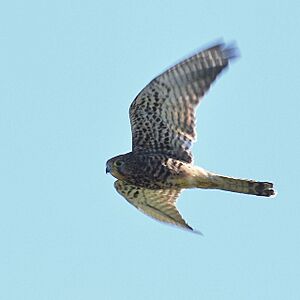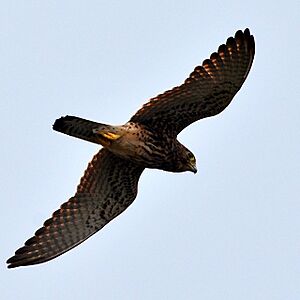Spotted kestrel facts for kids
Quick facts for kids Spotted kestrel |
|
|---|---|
 |
|
| Conservation status | |
| Scientific classification |
|
| Kingdom: | Animalia |
| Phylum: | Chordata |
| Class: | Aves |
| Order: | Falconiformes |
| Family: | Falconidae |
| Genus: | Falco |
| Species: |
F. moluccensis
|
| Binomial name | |
| Falco moluccensis (Bonaparte, 1850)
|
|
| Subspecies | |
|
|
| Script error: The function "autoWithCaption" does not exist. | |
Script error: No such module "Check for conflicting parameters".
The spotted kestrel (scientific name: Falco moluccensis) is a small, fast-flying bird of prey. It's also known as the Moluccan kestrel. These amazing birds are found in Indonesia.
Contents
About the Spotted Kestrel
Scientists don't know a lot about the spotted kestrel. But they believe it's a close relative of the Nankeen kestrel. The Nankeen kestrel's scientific name is Falco cenchroides. Both of these birds belong to a larger group. This group includes the common kestrel, Falco tinnunculus.
Where Spotted Kestrels Live
Spotted kestrels live all over Indonesia. You can find them in places like Wallacea and Java. They like open areas such as grasslands with a few trees. They also live near farms and the edges of thick forests. Sometimes, they fly along logging roads into the forest. They might even live in clearings inside wooded areas. These birds can also be found living near people.
Their Home Range
Spotted kestrels probably don't travel very far from their homes. They might move around a bit between the wet and dry seasons. We think this because their close relatives, the Nankeen kestrels, do something similar. Both spotted and Nankeen kestrels tend to stay in one place more than the common kestrel.
What Spotted Kestrels Look Like
Spotted kestrels are about 26 to 32 centimeters (10 to 12.5 inches) long. Their wings can spread out to 59 to 71 centimeters (23 to 28 inches). On average, they weigh about 162 grams (5.7 ounces). It's not as easy to tell the difference between male and female spotted kestrels by their size or feathers. This is different from the common kestrel.
Male and Female Differences
Male spotted kestrels have grey tails. Their tails have one wide dark band near the end and white tips. Female kestrels also have grey tails with white tips. But females have about nine dark bands on their tails.
Young Kestrels
Young spotted kestrels look a lot like the adult females. However, they appear darker and have more markings on their feathers.
Eggs
The eggs of the spotted kestrel look similar to those of the common kestrel. They also have a similar color and shape to the eggs of the Oriental hobby (Falco severus).
How Spotted Kestrels Behave
Spotted kestrels act a lot like the common kestrel. But as we mentioned, spotted kestrels tend to stay in one place more. This is different from their sister group, the common kestrel (F. tinnunculus).
Reproduction and Breeding
We don't know much about how spotted kestrels breed. But they have been seen getting ready to breed in June and July. This is during the dry season. One time, breeding was seen in August. They also showed breeding behavior in December and January, during the wet season. It's possible they breed in both seasons, but we need more information to be sure.
What Spotted Kestrels Eat
Spotted kestrels mainly eat small mammals, birds (like waterfowl and doves), lizards, and insects.
We don't know a lot about their exact hunting habits. But we can guess what they eat by looking at their closest relative, the Nankeen kestrel. On Christmas Island, a Nankeen kestrel population eats mostly giant grasshoppers. These grasshoppers are called Valanga irregularis. They make up 97% of the prey caught by Nankeen kestrels there. While insects are caught most often, larger animals like vertebrates make up most of the weight of their diet. Nankeen kestrels have also been seen eating spotted doves, western bearded dragons, mice, and other birds like common starlings.
Nesting Habits
Like other kestrels, spotted kestrels don't build their own nests. Instead, they use nests built by other birds of prey or crows. They can be found nesting in human-made buildings, old nests, or on cliff sides. In Indonesia, their nests have been found in the pointy roofs of traditional houses. They also nest in the tops of palm trees. They usually use these nests from March to September or October, which is their mating season. They like high places and open areas for their nests.
When we look at the Nankeen kestrel (their close relative), we see they lay 3 to 5 eggs at a time. The eggs hatch after about 28 days. Male Nankeen kestrels help the females keep the eggs warm. The young birds are ready to fly after 31 to 35 days.
Their Voice
The spotted kestrel has a common call that sounds like keek, keek, keek. This is similar to other kestrels. When they are flying, they often make a more scream-like call, which sounds like rrrrit, rrrrit, rrrrit.
See also
 | Tommie Smith |
 | Simone Manuel |
 | Shani Davis |
 | Simone Biles |
 | Alice Coachman |



